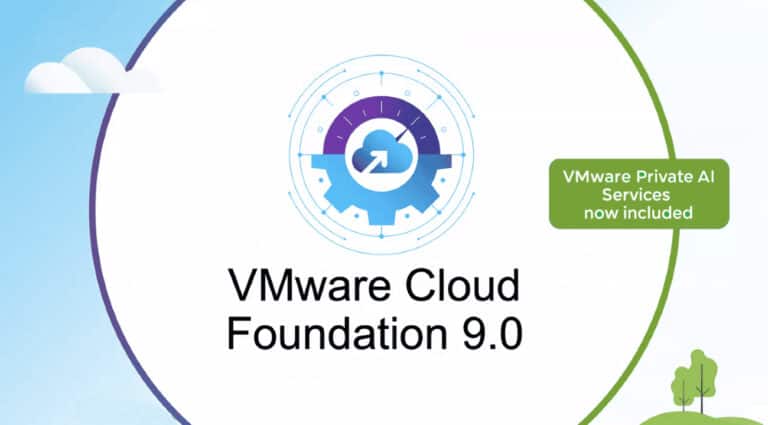VMware Cloud Foundation 9.0 will become an AI-native platform with Private AI Services included by default. Broadcom is positioning the private cloud as an alternative to costly public cloud strategies.
Nine of the top 10 Fortune 500 companies use VCF. According to Broadcom, the adoption of VCF 9 among Fortune 500 companies demonstrates the success of the new VMware strategy. With more than 100 million VCF core licenses sold worldwide, large organizations have shown significant confidence in the platform.
VCF transforms into AI-native platform
VMware Cloud Foundation 9.0 also marks a change in Broadcom’s AI strategy. Private AI Services will become a standard part of VCF, providing organizations with an integrated platform for both AI and traditional workloads at no additional cost.
Krish Prasad, senior vice president at Broadcom’s VMware Cloud Foundation Division, says that customers are reevaluating their cloud strategies and now expanding their private clouds. One of the reasons for this is to achieve cost-efficient AI implementations. To enable the next wave of AI innovation on-premises.
Future AI innovations on the roadmap
Broadcom will offer VCF customers access to VMware Private AI Services starting in the first quarter of 2026. These native AI services include GPU Monitoring, Model Store, Model Runtime, Agent Builder, Vector Database, and Data Indexing/Retrieval. They enhance privacy and security, simplify infrastructure, and streamline model deployment.
Several AI innovations are also in the pipeline. VCF Intelligent Assist, currently in tech preview, will be an AI-driven support assistant that diagnoses problems faster by consulting Broadcom’s knowledge base. Model Context Protocol support provides governance and security for MCP integrations with various tools such as Oracle, Microsoft SQL Server, PostgreSQL, ServiceNow, Github, and Slack. MCP enables an AI to communicate directly with a data source.
Multi-accelerator Model Runtime enables flexible AI model deployment on both AMD and NVIDIA GPUs without the need to refactor AI applications. Multi-tenant Models-as-a-Service delivers TCO savings by allowing tenants to securely share models within a single environment with complete data isolation.
Strategic hardware partnerships expanded
NVIDIA and Broadcom are deepening their collaboration to integrate the latest GPU, CPU, and networking innovations into VCF. Support for NVIDIA Blackwell Architecture, RTX Pro 6000, and ConnectX7 NICs enables next-generation AI models on the latest hardware.
In parallel, AMD is also collaborating with Broadcom on enterprise AI infrastructure. Customers can combine VCF with AMD ROCm Enterprise AI software and Instinct MI350 Series GPUs for fine-tuning large language models and RAG workflows within their own data centers.
Better productivity for developers
VCF should also make life easier for developers. The focus should be on applications, not infrastructure. The vSphere Kubernetes Service (VKS) now offers an enterprise Kubernetes environment for better application development in the private cloud.
The most important improvements here are support for S3 Object Store within vSAN without the need for a third party. After all these years, vSAN will finally support object storage. This means that vSAN now supports block, file, and object storage.
In addition, Broadcom has chosen to integrate GitOps better so that Git can now become the source of truth for Kubernetes. Both the infrastructure and the applications are stored as code in Git. There are also necessary improvements in the management of Kubernetes clusters, but this is less important for developers.
Broadcom’s choice to modernize VMware further and make the VCF suite more attractive to many customers by integrating Private AI Services may become an important step to retain many customers.
